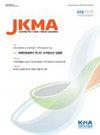生物制品治疗慢性鼻窦炎伴鼻息肉
IF 0.5
Q3 MEDICINE, GENERAL & INTERNAL
引用次数: 0
摘要
背景:慢性鼻鼻窦炎(CRS)又可分为伴有鼻息肉的CRS和不伴有鼻息肉的CRS。根据免疫内型又分为2型和非2型。目前,针对2型炎症的新型生物制剂被开发出来并用于治疗CRS合并鼻息肉。目前的概念:抑制白介素-4和白介素-13的Dupilumab和靶向免疫球蛋白E的omalizumab最近被批准用于韩国复发性CRS合并鼻息肉患者的治疗方案。许多研究表明,这两种生物制品对鼻腔症状有足够的影响,包括气味、生活质量和息肉大小。生物制品的适应症是难治性CRS伴鼻息肉,即使在鼻窦内窥镜手术后也有严重症状。然而,这些生物制品的主要缺点是费用高,因为它们是韩国国民健康保险规定的不偿还方案。讨论与结论:由于韩国CRS内型与西方CRS内型不同,以较少的2型CRS为特征,需要进一步研究dupilumab和omalizumab在韩国患者中的应用。此外,研究各种生物制品之间的疗效比较对于根据患者的内源性类型处方最合适的生物制品至关重要。本文章由计算机程序翻译,如有差异,请以英文原文为准。
Treatment with biological products for chronic rhinosinusitis with nasal polyp
Background: Chronic rhinosinusitis (CRS) is further classified as CRS with nasal polyp and CRS without nasal polyp. It is also divided into type 2 and none-type 2 by immunological endotype. Nowadays, novel biological products targeting type 2 inflammation are developed and used for the treatment of CRS with nasal polyp.Current Concepts: Dupilumab, which inhibits interleukin-4 and interleukin-13, and omalizumab, which targets immunoglobulin E, were recently approved and are currently being used as the treatment regimen for patients with recurrent CRS with nasal polyp in Korea. Many studies demonstrated enough effects of both biological products on nasal symptoms, including smell, quality of life, and polyp size. The indication of biological products is refractory CRS with nasal polyp with severe symptoms even after endoscopic sinus surgery. However, the main drawback of these biological products is a high cost since they are non-reimbursement regimens as defined by Korean national health insurance.Discussion and Conclusion: Further research on the use of dupilumab and omalizumab in Korean patients will be needed because the Korean CRS endotype, which is characterized by less-type-2 CRS, is different from Western CRS endotypes. Additionally, investigations on the comparison of efficacy among various biological products are essential to prescribe the most appropriate biological products depending on the patients’ endotypes.
求助全文
通过发布文献求助,成功后即可免费获取论文全文。
去求助
来源期刊

Journal of The Korean Medical Association
Medicine-General Medicine
CiteScore
0.50
自引率
0.00%
发文量
84
审稿时长
4-8 weeks
期刊介绍:
The Journal of the Korean Medical Association (JKMA) is the official peer-reviewed, open-access, monthly journal of the Korean Medical Association (KMA). It contains articles in Korean or English. Its abbreviated title is ''J Korean Med Assoc''. The aims of the Journal include contributing to the treatment of and preventing diseases of public health importance and to improvement of health and quality of life through sharing the state-of the-art scientific information on medicine by the members of KMA and other national and international societies.
 求助内容:
求助内容: 应助结果提醒方式:
应助结果提醒方式:


